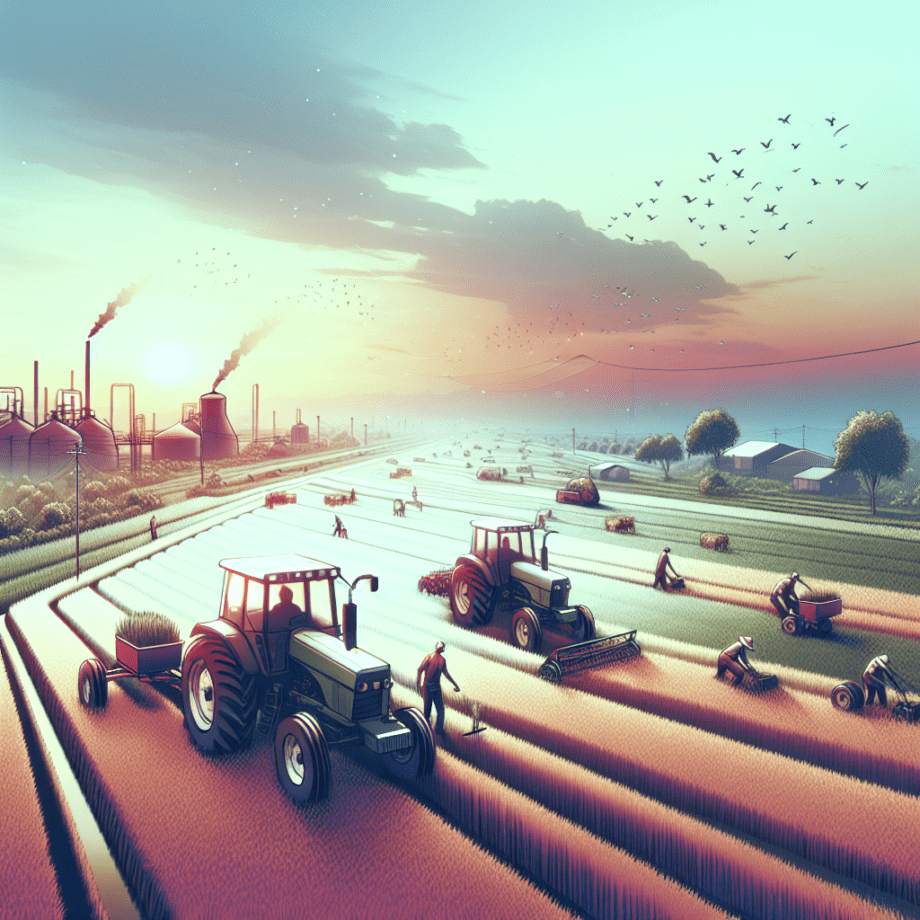Tractors have revolutionized small-scale farming by significantly enhancing productivity and efficiency. This article delves into the myriad benefits that tractors bring to small-scale farms, from labor savings to improved crop yields.
Increased Efficiency and Productivity
One of the most significant advantages of using tractors in small-scale farming is the dramatic increase in efficiency and productivity. Tractors are designed to perform a variety of tasks that would otherwise require extensive manual labor. These tasks include plowing, tilling, planting, and harvesting. By mechanizing these processes, farmers can complete them much faster and with greater precision.
Time Savings
Time is a critical resource in farming, and tractors help save a considerable amount of it. For instance, plowing a field manually can take several days, depending on the size of the land and the number of laborers available. In contrast, a tractor can accomplish the same task in a matter of hours. This time savings allows farmers to focus on other essential activities, such as crop management and marketing.
Labor Reduction
Tractors also reduce the need for manual labor, which is particularly beneficial for small-scale farmers who may not have the resources to hire additional workers. By using a tractor, a single farmer can manage a larger area of land more effectively. This reduction in labor costs can significantly improve the farm’s profitability.
Improved Crop Yields
Another crucial benefit of using tractors in small-scale farming is the potential for improved crop yields. Tractors enable more precise and consistent farming practices, which can lead to healthier crops and higher yields.
Precision Farming
Modern tractors are often equipped with advanced technologies such as GPS and automated steering systems. These features allow for precision farming, where tasks like planting and fertilizing are carried out with pinpoint accuracy. This precision ensures that seeds are planted at the optimal depth and spacing, and that fertilizers and pesticides are applied evenly. As a result, crops have a better chance of thriving.
Soil Health
Tractors can also contribute to better soil health. Traditional manual farming methods can lead to soil compaction and erosion, which negatively impact crop growth. Tractors, especially those with specialized attachments, can help maintain soil structure and reduce erosion. For example, no-till farming techniques, which can be easily implemented with tractors, help preserve soil moisture and organic matter, leading to healthier soil and better crop yields.
Versatility and Adaptability
Tractors are incredibly versatile machines that can be adapted to a wide range of farming tasks. This versatility makes them an invaluable asset for small-scale farmers who need to perform various activities throughout the farming cycle.
Multiple Attachments
One of the key features of tractors is their ability to use different attachments and implements. These attachments can be easily swapped out to perform different tasks, such as plowing, harrowing, planting, and harvesting. This adaptability means that a single tractor can replace multiple specialized machines, saving both space and money for small-scale farmers.
Year-Round Use
Tractors are not limited to a single season or type of crop. They can be used year-round for various activities, including soil preparation, planting, crop maintenance, and harvesting. This year-round utility ensures that the investment in a tractor is maximized, providing continuous benefits to the farm.
Economic Benefits
Investing in a tractor can have significant economic benefits for small-scale farmers. While the initial cost of purchasing a tractor may be high, the long-term savings and increased profitability can outweigh this expense.
Cost Savings
As mentioned earlier, tractors reduce the need for manual labor, which can lead to substantial cost savings. Additionally, the increased efficiency and productivity mean that farmers can produce more crops in less time, leading to higher revenues. Over time, these savings and increased earnings can offset the initial investment in the tractor.
Access to Financing
Many financial institutions and government programs offer loans and grants specifically for purchasing agricultural machinery. These financing options can make it easier for small-scale farmers to invest in a tractor, even if they do not have the upfront capital. By taking advantage of these opportunities, farmers can improve their operations and increase their profitability.
Environmental Benefits
Using tractors in small-scale farming can also have positive environmental impacts. Modern tractors are designed to be more fuel-efficient and produce fewer emissions than older models, contributing to a reduction in the farm’s carbon footprint.
Reduced Chemical Use
Precision farming techniques enabled by tractors can lead to a reduction in the use of fertilizers and pesticides. By applying these chemicals more accurately, farmers can use smaller quantities while still achieving the desired results. This reduction in chemical use is beneficial for the environment, as it decreases the risk of soil and water contamination.
Conservation Practices
Tractors can also facilitate the implementation of conservation practices such as no-till farming and cover cropping. These practices help preserve soil health, reduce erosion, and improve water retention. By adopting these methods, small-scale farmers can contribute to sustainable agriculture and environmental conservation.
Conclusion
In summary, the benefits of using tractors in small-scale farming are numerous and far-reaching. From increased efficiency and productivity to improved crop yields and environmental sustainability, tractors offer a range of advantages that can significantly enhance the success of small-scale farms. By investing in a tractor, farmers can save time and labor, improve their economic outcomes, and contribute to a more sustainable agricultural future.
